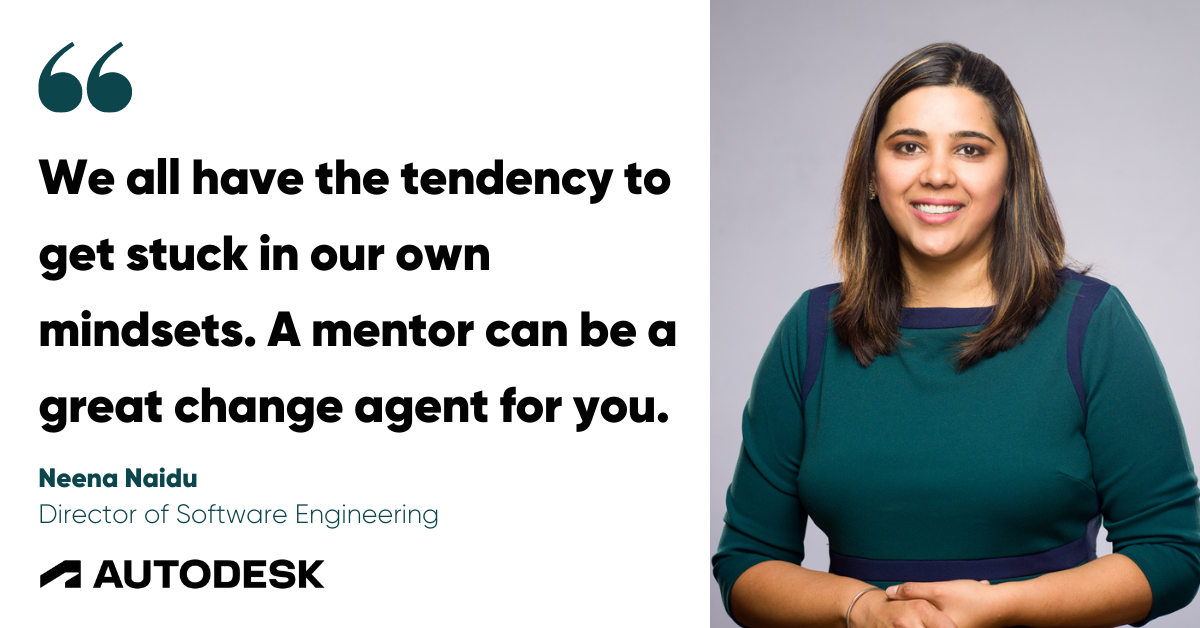Neena Naidu's favorite metaphor for understanding the importance of different perspectives comes from medicine.
"If a doctor recommends a big surgery to you, you go and look at different surgeons and get different feedback, right?" she says. "You don't just take the one thing that somebody said. You're investing time and money. In a similar way, [with your career], find a couple of people to run your situation by and ask for different opinions, because those are different options, and you'll see which fits best with the way you want to go."
Neena is currently a Director of Software Engineering at Autodesk, and she credits her long and successful career in software in part to the many mentors that have guided her along the way.
We sat down with her to hear about how she sought out those relationships, what they've taught her, and how she seeks to pay them forward now—as well as what tips she has for other underrepresented talent in tech looking to make the most out of mentorship.
Finding Her Ambition and Embracing Growth
When she was growing up, Neena wasn't obsessed with a particular subject or career. She didn't even really like school all that much, though her parents would have loved it if she did.
"I had this happy-go-lucky time," she explains of her high school years. When it came to college majors, she knew she wanted hers to be in some kind of engineering, but by the time she got around to signing up, she had missed some of the selection tests for several engineering majors.
"Computer science was still open, so that's why I studied that!" says Neena, smiling.
But while she chose her major by default, she soon grew to love it—and to recognize how powerful it could be to be inspired by peers and mentors along the way.
"There was a pivotal point between finishing 12th grade and my first bachelor's where my mindset shifted to learning more," Neena explains. "I wasn't focused, and then I met people who were going to the U.S. to study." Her peers inspired her to take the GRE and apply to do a master's in the U.S.
She wasn't shocked when she got in, but she thinks some people back home probably were. "I was a very social kid growing up, and I think it comes as a surprise to a lot of the folks that I've known through my childhood that I'm doing what I'm doing," Neena says. "But things can change in life, and it's never too late to do what you want to do."
Embracing Mentorship as a Tool to Build a Career
Studying in the U.S. was one thing. Figuring out how to work here long-term was another. Neena knew that she would need to rely on building relationships in order to secure her career path. She started by reaching out to her U.S. counterparts at the company she'd worked at in India before moving to the States for her master's and by talking to the counselors at her university.
"I started asking, 'Are there any opportunities for me?'" remembers Neena. "And through that process, I was able to find an internship."
That wasn't a new muscle for Neena, who had talked to her manager in India about wanting to leave the company even when others wouldn't have breathed a word to their supervisor for fear of being fired. "He had created an environment as a leader where it was clear that people have choices, people have passions, and it's okay if they want to pursue those passions," she says. "We'd formed a relationship and it felt natural to open up and talk to him about what I wanted to be and what I wanted to do."
Neena now considers that manager to be her first work mentor, and she learned a couple key lessons from him:
- Pressure can be managed. "Looking at a mentor and seeing how they behave under pressure, it's almost like a parent, right? You watch people, you learn something from them," says Neena, who says she benefited from watching her manager never really lose his cool, even in very tense moments.
- Always ask for the next connection. Neena isn't naturally shy, and her first helpful mentorship relationship inspired her to pursue the next ones. "I'd question my supervisor and managers saying, 'Hey, who would you recommend? I'm looking at doing X, Y, and Z,' and they'd think through their network and say, 'Okay, this person has done something similar, maybe you should connect with him or her.'"
Finding Her Next Challenge at Autodesk
The lessons that had helped Neena land her first internship in the States also helped her turn it into her first full time role. And what she learned at that job—both about work itself as well as about what she wanted to pursue more of—helped her find her next few roles. She's been a technical program manager, a senior software engineer, a business analyst, and a consultant working with big clients like Cisco and Disney, among other things, always looking for opportunities to work directly with technologists, to deliver projects that meet user needs, and to keep learning.
During COVID, Neena got to thinking about what she wanted next in her career, and she realized she wanted a chance to be more strategic and to manage a bigger book of business. She reached out to her mentors and coaches and started fielding opportunities—including one from Autodesk.
"Learning about the role, it was an opportunity to create my own team, to set a precedent for that process, and to take in the existing culture and influence it," she says. "It really was very exciting for me. I like to do things a bit out of the box, to work with different people and find the best solution. Especially at a people-paced organization where I can be who I am and still learn and grow in my new role."
Passing It On: 6 Tips on Mentorship
Even when she was pursuing it, Neena didn't always recognize mentorship as such a powerful force in her life. "I probably didn't have a name for it early on," she says. "I was just finding myself in situations where I needed some feedback, and I'd find a colleague or a friend. Soon enough, that became a necessary part of my own voice."
Neena remembers working for a woman—her manager's manager at the time—who shared with Neena that mentors had been pivotal to her own career journey. "From then, I knew it was a constant thing that I had to put time and energy into," says Neena.
But formalizing how she sought out advice didn't really change the mechanics of doing it. There's no one right way to be a mentee, says Neena, who adds that sometimes she'll check in with mentors every six months and other times every two weeks.
"I do think it's the mentee's responsibility to reach out to the mentor. I always take it as an active responsibility on my part," she says.
If you're ready to make the most of mentorship in your career, Neena recommends the following:
- Get clear on the rules of engagement. Are conversations confidential? What topics are off-limits, if any?
- Define the agenda ahead of time. There are different types of mentors: ones from whom you want to extract information and ones who are just there to listen. Ones who are ready to help problem solve and ones who are there to set a strategy with you. What kind of relationship is this? If it changes often, what's on the agenda for this specific meeting?
- Don't bite off more than you can chew. Now that she's a mentor herself, Neena doesn't take on more than 3-5 regular mentees at a given time, though she's always open for one-off conversations on specific subjects. On the mentee side, looking for multiple mentors is a good idea, but don't over-commit to more relationships than you can successfully manage. Do keep in mind that some relationships will come to a natural end. "It's okay to circulate through mentors," says Neena.
- Be strategic. When looking for a mentor, Neena suggests an exercise. Start by writing down your goals, then identify the gaps you have that would keep you from getting there. With those gaps, look for people with influence in your organization who could help coach you on filling them.
- Don't feel guilty. Making an ask of a busy person can feel stressful. But leaders want to help, says Neena. "If you reach out to five people, four of them will probably say, 'Sure, of course, I can find 15 minutes to talk to you,'" says Neena, who adds that making the request personal, like by highlighting shared backgrounds, goes a long way.
- Embrace its impact. "We all have the tendency to get stuck in our own mindsets," says Neena. "A mentor can be a great change agent for you. And mentorship isn't always just for career building—it's for your own personal growth as well."
Ready to learn more about mentorship at Autodesk? Check out their open roles!




